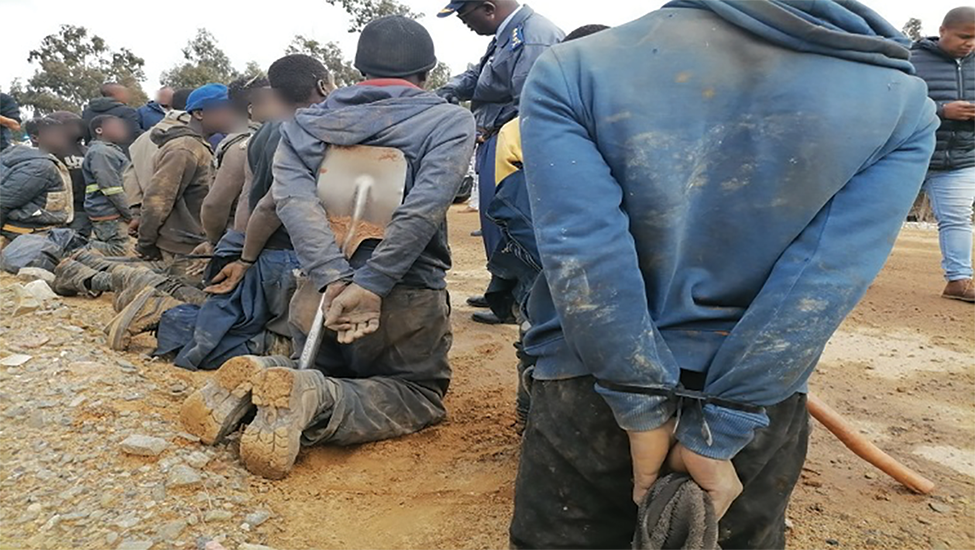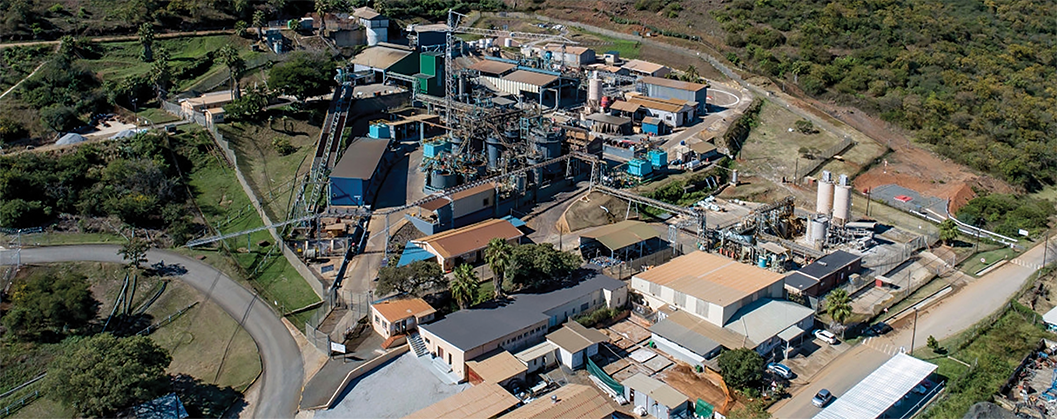TAKEDOWN: More suspected to be still underground as police ponder another clampdown…..
By Lehlohonolo Lehana
SA Police Services (SAPS) has arrested 1 000 illegal miners at the Sheba Gold Mine in Barberton, during Operation Vala Umgodi, a coordinated effort by police and various other agencies to combat illicit mining activities.

Mpumalanga police spokesman Donald Mdhluli says there could be more arrests because there are still illegal miners underground.
“As they are coming out, they have been taken,” said Mdhluli. “About 1 000 illegal miners who are also illegal immigrants have been arrested,” Mdhluli said, calling it a joint operation between mine security and the police. He said that there were no casualties recorded by last night.
The Sheba Mine said in a statement: “Earlier this year there was outcry from the community and employees when Barberton Mines retrenched workers as the mine was unprofitable and facing closure. Now we know the reason why!
“Food and supplies have been getting to a thriving illegal mining world underground, which had to be stopped, hence this intervention with the police and mine security. This message needs to be spread and illegal mining will not be tolerated,” it added.
The police operation, which started on Monday, targeted clandestine mining near the village of Barberton, close to the borders of eSwatini and Mozambique. Mpumalanga community safety and security MEC Jackie Macie says the crackdown was a significant step in the government’s fight against crime— and illegal immigration and mining. He says the illegal movement of people into the country has a negative impact on the safety and security of communities.
Macie also highlighted the devastating environmental consequences of illegal mining.
He has called for continued collaboration between law enforcement and communities, urging residents to report illegal miners instead of accommodating them.
According to the Department of Mineral Resources and Energy, there has been an increase in illegal mining in the county with miners risking their lives to mine in completely unsafe and hazardous conditions. They pay the ultimate price due to underground fires and fall of ground accidents.
These illegal activities have become fodder for crime syndicates who control mineshafts. In May last year, four illegal miners also died after a fight broke out at the Transvaal Gold Mining Estate in Dientjie in Mpumalanga.
Illegal mining has made a considerable dent in the economy. The cost of illegal mining is estimated to be over R70 billion annually in gold alone and resulting in huge losses of revenue for both the government and the mining sector.
Importantly, these illegal activities have a negative impact on the safety and health of surrounding communities. This also impacts on the overall wellbeing of the environment and is a risk to the sustainability of the mining industry.
Government is concerned about the practice of illegal mining and we are taking measures to put an end to it. In November 2023, President Cyril Ramaphosa authorised the deployment of 3 300 South African National Defence Force (SANDF) personnel to support SAPS in their fight against illegal mining for a six-month period.
The SANDF deployment supports a multi-sectoral effort that brings together the SAPS, State Security Agency, Border Management Authority and the departments of Mineral Resources and Energy, Home Affairs, Justice and Constitutional Development, Environmental Affairs and others.
Furthermore, the National Coordination and Strategic Management Team (NCSMT), which was established in 2010 continues to co-ordinate the government’s efforts to fight illegal mining and the trafficking of precious metals.
The NCSMT is made up of representatives from the Department of Mineral Resources and Energy, South African Police Service, Intelligence Services and the Department of Home Affairs and ensures that those involved in illegal mining are arrested and prosecuted. Secondly, this multi-departmental body has prioritised promoting legitimate mining practices through the authorisation of mining permits.
This approach to regulate small-scale or artisan mining is in line with the African Mining Vision’s action plan which was adopted by African heads of state in 2009. The Action Plan includes creating a “mining sector that harnesses the potential of artisanal and small-scale mining to advance integrated and sustainable rural socio-economic development”. There was an increase in the number for the authorisation of mining permits in 2024. In 2018 alone, we had 500 applications.
In addition to NCSMT, the government has established forums in Mpumalanga, Free State, Gauteng and Northern Cape to implement measures to eradicate illegal mining. These forums are made up of officials from the Department of Mineral Resources and Energy, the National Prosecuting Authority (NPA), the South African Police Service, Visible Policing and Crime Intelligence, as well as officials from the South African Diamond and Precious Metals Regulator, the Department of Home Affairs, Council for Geoscience, municipalities affected by these illegal activities, mining companies and organised labour.
These forums meet once a month to deliberate on possible measures that can be implemented to combat illegal mining and reports from these forums are submitted to the NCSMT. – Additional reporting by SAnews
MIRROR Briefs
USA TARIFFS A BLOW TO SA
President Cyril Ramaphosa says his administration would draft measures to support exporters hit by U.S. new 30% tariff, which is expected to trigger widespread job losses in the automotive and agriculture industries. South Africa is the only country from sub-Saharan Africa singled out in the announcement, reflecting US strained relationship with Pretoria.
Other African nations, including Lesotho and Zimbabwe, have been hit with a 15% tariff, which will also come into effect in seven days. The decision is a huge blow to South Africa, as the US is its second-biggest trading partner.
South Africa’s automobile, farming and textile sectors had enjoyed duty-free access to the US market under the African Growth and Opportunity Act (Agoa).
Ahead of Donald Trump’s August 1, 2025 deadline, South Africa had been trying to agree a trade deal with the US, which included buying US liquefied natural gas, simplifying rules for US poultry imports and investing in US industries like mining.
These reciprocal tariffs, initially due to take effect on August 1 and part of broader measures affecting multiple trade partners, will now take effect from August 7, 2025. – Lehlohonolo Lehana.
SA’S NEW DEPUTY CHIEF JUSTICE
President Cyril Ramaphosa has appointed Justice Dunstan Mlambo as Deputy Chief Justice of the Republic of South Africa, with effect from August 1, 2025.
The appointment is in accordance with section 174(3) of the Constitution.
“Judge Mlambo has since November 2012 served as Judge President of the Gauteng Division of the High Court of South Africa.
“President Ramaphosa has in writing informed Chief Justice Mandisa Maya that in appointing Justice Mlambo, the President has considered the views of the Judicial Service Commission and the views of political parties represented in the National Assembly,” the Presidency said in statement.
The President also expressed to the Chief Justice his appreciation for the transparent, inclusive and robust process undertaken by the JSC. “This process exemplified the Commission’s commitment to upholding the nation’s constitutional values,” said the Presidency.
The Commission had enhanced the nation’s confidence that the appointment of the Deputy Chief Justice was firmly grounded on merit, fidelity to the Constitution and a vision for the continued transformation and strengthening of the Judiciary.
The position of Deputy Chief Justice had been vacant since then Deputy Chief Justice, Mandisa Maya, became Chief Justice following the retirement of Chief Justice Raymond Zondo last year. – SAnews
MBEKI FINGERED IN APARTHEID CASES.
The Gauteng High Court in Pretoria has dismissed former President Thabo Mbeki and his Justice Minister, Brigitte Mabandla’s, bid to intervene in the apartheid-era crimes lawsuit.
Mbeki succeeded Nelson Mandela to become the second President of democratic South Africa.
The families, and the Foundation for Human Rights, filed a court application against President Cyril Ramaphosa and the government in January seeking R167-million in constitutional damages.
The families accuses government for “gross failure” to adequately investigate and prosecute apartheid-era political crimes following the Truth and Reconciliation Commission (TRC). The TRC was established in 1995 as South Africa’s transitional justice vehicle, granting amnesty to qualifying perpetrators of human rights violations, and making recommendations on reparations for victims and prosecution of those not granted amnesty.
Former National Director of Public Prosecutions Vusi Pikoli and National Prosecuting Authority officials had stated that interference from Mbeki’s government resulted in the NPA ending TRC investigations into apartheid crimes by those that denied offenders’ amnesty.
Pikoli was fired in 2007 by Mbeki.
Mbeki denied there was a secret pact that would have spared himself and other ANC members from potential prosecution for activities during the anti-apartheid struggle. He added that he never interfered in the cases. – Lehlohonolo Lehana.
MEASLES OUTBREAK WARNING
As part of ongoing efforts to prevent the further spread of measles, the Free State Department of Health has called on parents and guardians to ensure that they and their children are up to date with their vaccinations, in accordance with the provisions of the Road to Health Booklet. The department reported 93 laboratory confirmed cases of measles as of week 29 in the Lejweleputswa District. “Since the first positive case was detected in the private health sector on 23 February 2025, the department has taken decisive action to control the outbreak. The initial cases in Lejweleputswa were followed by a series of confirmed cases, with the most affected sub-district being Matjhabeng, which accounts for 42 of the total cases.
“The Nala area has also seen an increase in cases, necessitating continued vigilance and response efforts,” the department said.
The department reported that the outbreak in Mangaung had been declared over, which it described as a testament to the effectiveness of the outbreak response measures.
In Lejweleputswa, while sporadic cases have been observed from weeks 20 to 29, the department said the outbreak was under control.
The focus remained on the areas with higher numbers of unvaccinated individuals, particularly in Matjhabeng and Nala. – SAnews































